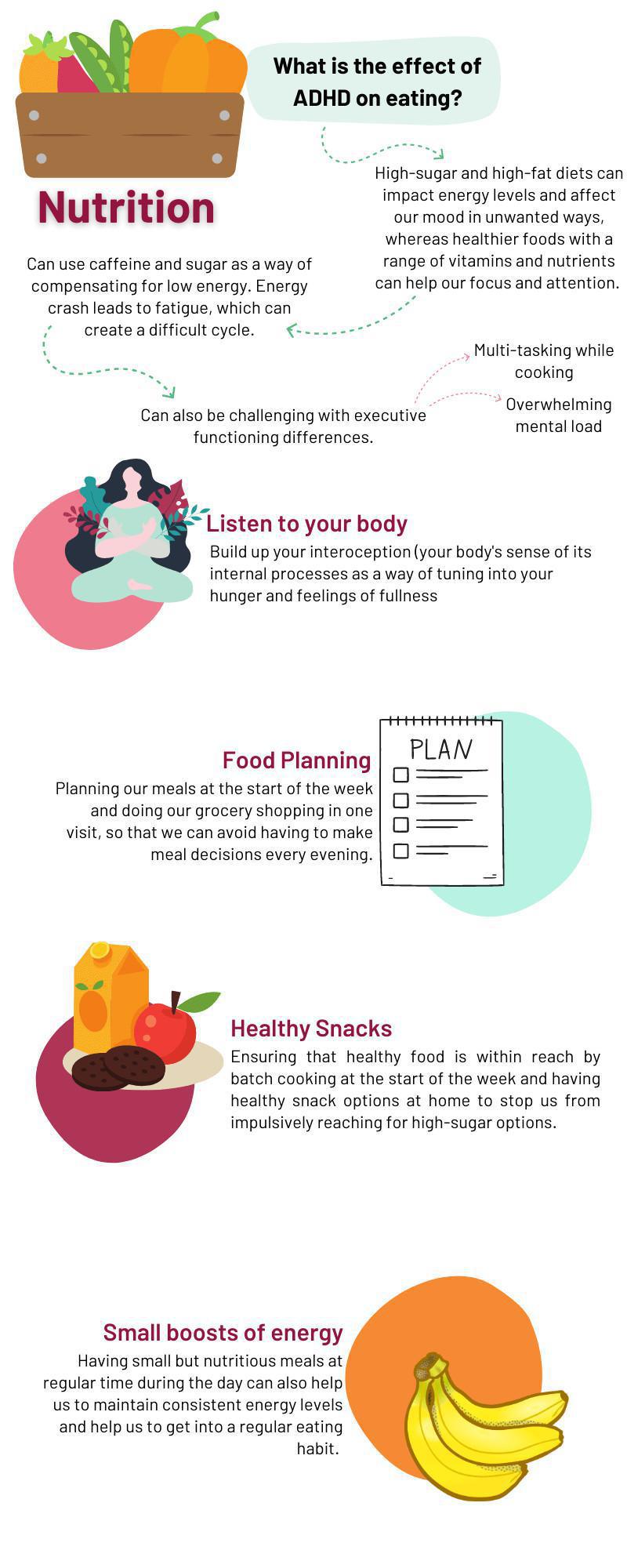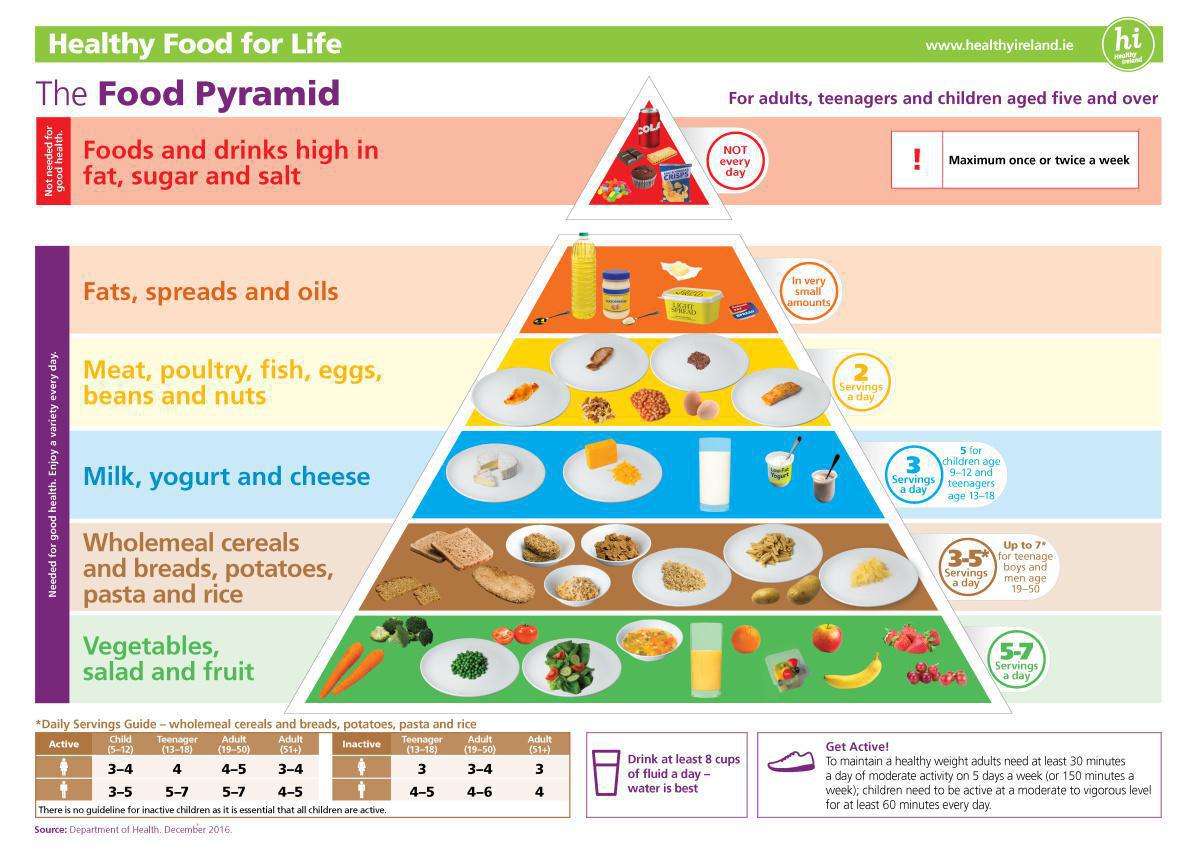Nutrition
What is the relationship between ADHD and nutrition?
- High-sugar and high-fat diets can impact energy levels and affect our mood in unwanted ways, whereas healthier foods with a range of vitamins and nutrients can help our focus and attention.
- Sometimes tiredness makes it more likely that ADHDers drink coffee or sugary drinks for a boost of energy, to compensate for our brain’s differences in the ability to stay alert However, we can have an energy crash soon after, leaving us feeling tired and irritable, which can create a cycle of fatigue. Slow-energy-releasing foods help us to sustain those energy levels for longer and have a more helpful impact on our focus and attention.
- Eating well can sometimes be challenging for ADHDers given our executive functioning differences. Sometimes it can be easier to reach for quick and convenient food rather than cooking a meal that involves multi-tasking and using our working memory. Many who have ADHD feel overwhelmed when faced with the mental load of preparing food, particularly if it is a new recipe. This makes sense given the ADHD brain’s differences in ability to organise and get started for tasks, or sustaining and shifting attention.
What can I do?
- We can shift our relationship with food from viewing it as ‘good’ or ‘bad’. Instead, it invites us to listen to our bodies and eat what feels right for us by tapping into when our body is telling us it feels hungry or satisfied, as well as thinking about the food that will best help us to thrive with our ADHD. ADHD brains have a different sense of interoception – this is the awareness of our body’s cues, like when we are hungry, full, or tired. There are different ways to boost our overall interoception, which will help us to recognise cues about eating. Overall, it is about practicing attending to the sensations in our bodies and asking – what am I feeling in my body right now? These include:
- Exercise
- Dancing
- Yoga
- Meditation/deep breathing
- Progressive muscle relaxation
- Sports
- Music
- Planning our meals at the start of the week and doing our grocery shopping in one visit, so that we can avoid having to make meal decisions every evening.
- Ensuring that healthy food is within reach by batch cooking at the start of the week and having healthy snack options at home to stop us from impulsively reaching for high-sugar options.
- Having small but nutritious meals at regular time during the day can also help us to maintain consistent energy levels and help us to get into a regular eating habit.
- You can find information about healthy eating from the HSE by clicking this link.
References
Abd El Baaki, O. M., Abd El Hamid, E. R., Zaki, S. T., Alwakkad, A. S. E. D., Sabry, R. N., & Elsheikh, E. M. (2021). Diet modification impact on ADHD outcome. Bulletin of the National Research Centre, 45(1), 15. https://doi.org/10.1186/s42269-020-00466-x
Cagigal, C., Silva, T., Jesus, M., & Silva, C. (2019). Does Diet Affect the Symptoms of ADHD? Current Pharmaceutical Biotechnology, 20(2), 130–136. https://doi.org/10.2174/1389201019666180925140733
Hershko, S., Cortese, S., Ert, E., Aronis, A., Maeir, A., & Pollak, Y. (2020). The influence of attractiveness and convenience cues on food appeal in adults with and without ADHD. Appetite, 150, 104679. https://doi.org/10.1016/j.appet.2020.104679
Li, L., Taylor, M. J., Bälter, K., Kuja‐Halkola, R., Chen, Q., Hegvik, T.-A., Tate, A. E., Chang, Z., Arias‐Vásquez, A., Hartman, C. A., & Larsson, H. (2020). Attention-deficit/hyperactivity disorder symptoms and dietary habits in adulthood: A large population-based twin study in Sweden. American Journal of Medical Genetics Part B: Neuropsychiatric Genetics, 183(8), 475–485. https://doi.org/10.1002/ajmg.b.32825
Mohammadpour, N., Jazayeri, S., Tehrani-Doost, M., Djalali, M., Hosseini, M., Effatpanah, M., Davari-Ashtiani, R., & Karami, E. (2018). Effect of vitamin D supplementation as adjunctive therapy to methylphenidate on ADHD symptoms: A randomized, double blind, placebo-controlled trial. Nutritional Neuroscience, 21(3), 202–209. https://doi.org/10.1080/1028415X.2016.1262097
Wang, L.-J., Yu, Y.-H., Fu, M.-L., Yeh, W.-T., Hsu, J.-L., Yang, Y.-H., Yang, H.-T., Huang, S.-Y., Wei, I.-L., Chen, W. J., Chiang, B.-L., & Pan, W.-H. (2019). Dietary Profiles, Nutritional Biochemistry Status, and Attention-Deficit/Hyperactivity Disorder: Path Analysis for a Case-Control Study. Journal of Clinical Medicine, 8(5), 709. https://doi.org/10.3390/jcm8050709
Weissenberger, S., Ptacek, R., Vnukova, M., Raboch, J., Klicperova-Baker, M., Domkarova, L., & Goetz, M. (2018). ADHD and lifestyle habits in Czech adults, a national sample. Neuropsychiatric Disease and Treatment, 14, 293–299. https://doi.org/10.2147/NDT.S148921




